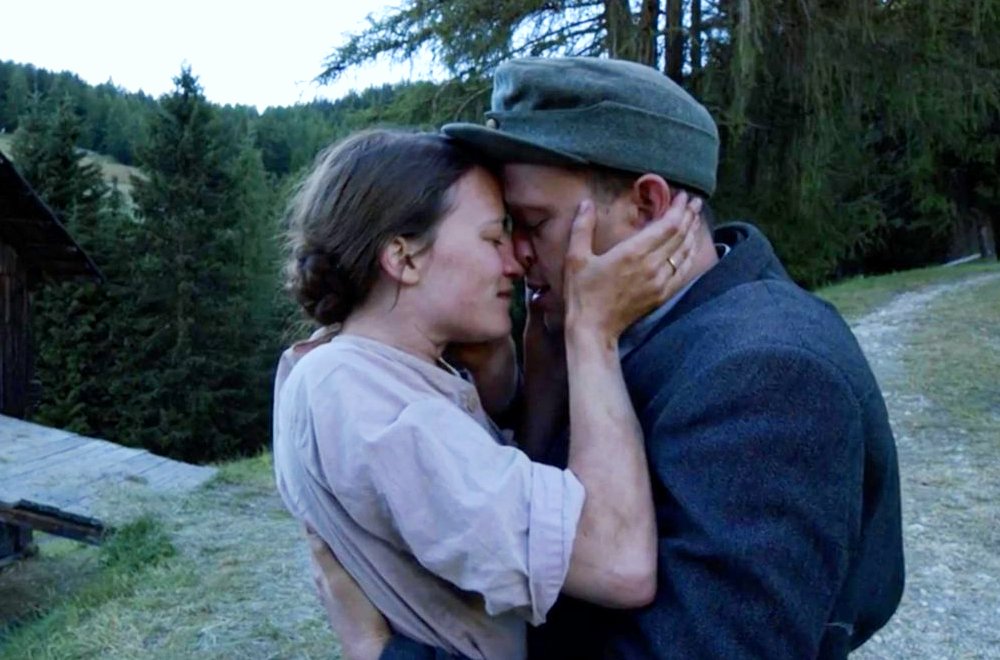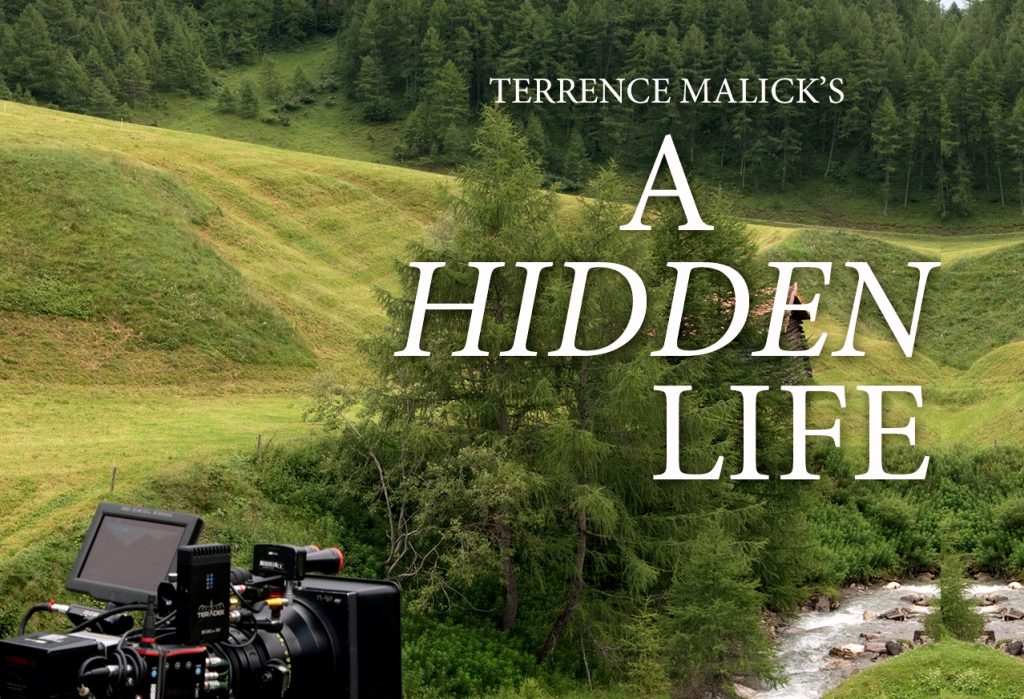
“…for the growing good of the world is partly dependent on unhistoric acts; and that things are not so ill with you and me as they might have been, is half owing to the number who lived faithfully a hidden life, and rest in unvisited tombs.” – George Eliot
God Malick gives us all agony and no ecstacy in his pedagogic telling of a World War II conscientious objector whose family was persecuted because he refused to “Heil, Hitler” or pass out personal items to Nazi soldiers asking for him to share in the war effort. Malick barrages us with his haywire montages, his restless camera and impressionistic cuts; he also repeats his messages endlessly because he doubts we are more than children and that we will not understand.
If I didn’t know any better I’d say Malick made the film to comment that we live in a very stupid world trapped by xenophobia and banded together in groupthink, but I’d like to suppose it’s more likely Malick made it because he wants us to know about a true life virtuous Austrian man who denounced Hitler when everybody else in his village was afraid to defy conformity (see above quotation that is used at the end titles). The over-cutting, which turns dialogue exchanges into montage form that’s bad trademark Malick, keeps us though on the outside of the characters.
Malick has a great gift and has in the past demonstrated that he has the wisdom of an altruistic God. But he now berates us and punishes us with an excessive just-under three hour running time. A Hidden Life is hell to sit through, but there are a toss of two dozen moments that I’m at least glad I absorbed. Now that Malick has wrapped up this project he’s in his off time I’d guess immersed in painting classes, or takes afternoon walks while penning poetry, or sips English tea while stirring in intellectual conversations with his closest confidants. But on the basis of this film, I cannot help but worry though that Malick is a misanthrope who is turning into the God Complex of Tommy Lee Jones in “Ad Astra.” His personal connectiveness with his audience is becoming unreachable.
With August Diehl as Franz Jägerstätter, Valerie Pachner as his wife Franziska, and Bruno Ganz in his final role as a judge.
174 Minutes. Rated R.
Film Cousins: “The Sound of Music” (1965); “The Garden of Finzi-Continsis” (Italy, 1970); “Sophie Scholl: The Final Days” (2005, Germany); “Defiance” (2009).
Opens with gnarly exploitation violence. Then we get introduced to the characters, and more characters after that. They are a gallery of interesting characters. What S. Craig Zahler was so good at from the start of his career was creating flavorful dialogue that burrows deep into the time and place of where it is set—his debut, the Old West. The dialogue is tough, weary, twang-filled, even self-reflective. Yet borderline stylized in a way that sounds like contemporary Q.T. pop poetry.
Plot in motion: A woman doctor (Lili Simmons) is abducted from a civilized town which embarks Sheriff Franklin Hunt (Kurt Russell) as well as Richard Jenkins, Matthew Fox and Patrick Wilson to go rescue her. Some feral cave people have come and taken her, but whom these cave people look like is initially murky.
Lots of tough-guy quarrels and near-mutiny ensues (too much of it) while these cowboys are on the journey. Then this movie western takes a serious left turn and becomes a piece of horror carnage: the cave men have been so ungodly and deranged for so long that they are the most extreme of savages, like worse than the mutant folk from “The Hills Have Eyes.” They take one folk and literally scalp and rip him down one half. <em>Bone Tomahawk</em> is a sick and subversive work made on an indie budget with full license to do whatever the hell it wants, yet something about the end is unsatisfying and piecemeal about it. Zahler does shock the Dickens out of you with his debut, but he got even better with “Brawl in Cell Block 99” and “Dragged Across Concrete.”
Walter Hill’s cluttered and moribund biopic on the famous gunslinger at the tail end of his life, so many tales of his tail end. <em>Wild Bill</em> is strangely arty for a western, with dutch angles, blotchy black & white, strong key lights on lead Jeff Bridges face in color shots, elegiac John Hurt voice-over narration. But the erratic way with itself never allows Bridges to breathe inner life into the character. He’s all greasy hair, and slurs, and downed whiskey shots. Surface behavior.
Ellen Barkin makes a gumption-and-wisecracking Calamity Jane. Diane Lane as a beloved damsel whose destiny with Bill was cut short, although we are unsure on why Hill’s emphasis was curious on this relationship anyway. David Arquette as a crazy-eyed dumbbell upstart who wants rid of Bill. Never heart-pounding rivlary. Just enervating. Actually, that blotchy black & white almost surreal in a way that it feels quasi-documentary, like a camera time warp to the past—those shots a tad interesting, in retrospect.





Recent Comments
rudolfmenon Says,
Totally agree. And we left the cinema really disappointed.
rudolfmenon Says,
Really? Wow, then im going to watch this! I could watch District 9 ...
soulreaver99 Says,
The trailer to the movie itself was half-assed. Totally not surprising that ...
hashbrowny Says,
Great family movie...I disagree with your view. Maybe you've lost your ...
calipoppy Says,
Man of Steel is a Hunk of Kryptonite.I enjoyed the movie.